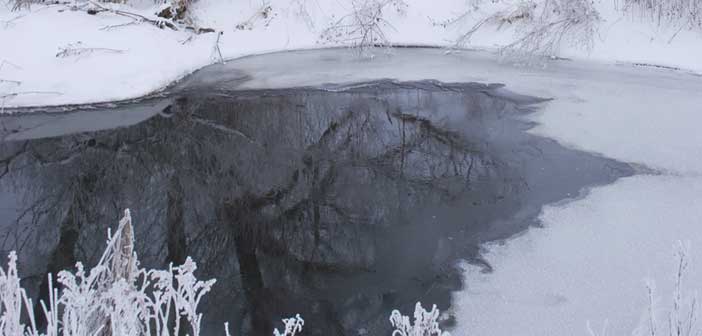JULIA BAY—An Evansville area man was rescued from the frigid waters of Julia Bay on Saturday afternoon by two men who risked life and limb to save his life.
Gore Bay resident, Brian Dittmar, who is an avid snowmobiler was contacted by Lisa Addison when she saw a four-wheeler carrying two people break through the ice just after 1 pm on Saturday while fishing out on Julia Bay. She heard their screams as their machine crashed through the ice, leaving them both in the icy cold waters.
Mr. Dittmar told The Expositor on Monday that Ms. Addison first called 9-1-1 to report what she had just witnessed on the other side of the bay, then called him. Mr. Dittmar still had his two snowmobiles loaded on his trailer from a recent trek to points north and so, heeding the call, took a quick inventory of what he might need, including a roof rake—the longest, lightest instrument he could find in short notice—and headed in the general direction of where he thought the incident had occurred, parking along the Barrie Island causeway and unloading one of the machines. Mr Dittmar said that he left the trailer open and with a key in the ignition of the other snowmobile in case a fellow rescuer should come and assist.
In the meantime, Mr. Dittmar’s wife called another West End resident, Wendell Clarke, to inform him of the situation and also dispatch him to the scene.
“I headed out to where I roughly thought it happened,” Mr. Dittmar told The Expositor. At the same time, Julia Bay resident Steve Prior showed up with his ATV, also ready to help. The pair saw no sign of anyone just “debris,” as Mr. Dittmar described it—mittens, helmets.
Mr. Prior had brought with him a rope, about 15 ft. long, which the two men used to tie off on one another. Mr. Prior stayed farther back while Mr. Dittmar inched ever closer to the hole where the debris lay, following footsteps that came from the area. He realized that one of the helmets had been obviously abandoned, indicating someone had made it to shore, but the other helmet bobbed in the water and, when he tapped it with the edge of the roof rake, it moved ever so slightly. “It was him, and he was face up,” Mr. Dittmar said of the discovery. “His mouth, or maybe just his nose, was sticking out of the water.” Mr. Dittmar thought he recognized the man and, it turns out, he was right. That man was Kirk Longmuir.
Mr. Dittmar said Mr. Longmuir appeared to be semi-conscious, and so they began to yell at him to grab hold of the rake. Mr. Longmuir could barely lift his arm in return. For several moments the rescuer tried to organize the rake under his arm, but this didn’t work. The rake kept getting stuck.
“I got closer, inching, just to the point where the ice was mush and then I went in too,” Mr. Dittmar recounted. With Mr. Prior tied to him, Mr. Dittmar grabbed hold of the Mr. Longmuir’s hood and, pushing himself backwards, both in the icy water, began to make their way through the mush, foot by foot, until the hood broke away from Mr. Longmuir’s jacket. Eventually, using this same method, they found their way up and onto safer ice. Mr. Dittmar recalled that when he was pushing the victim through the mushy ice, they were following the trough left behind by the four-wheeler as it broke through the ice.
“He couldn’t do anything,” Mr. Dittmar said of Mr. Longmuir.
The rescuers decided their next move at that point, realizing that just because he was free from the water did not mean that he was not still in perilous danger. They pulled Mr. Longmuir across the ice with the rope until the ice was thick enough to stand on. Realizing that a snowmobile would not help the situation as a mode of transport, the two men decided to load the semi-conscious man onto Mr. Prior’s two-up ATV and Mr. Prior would pin Mr. Longmuir in his seat using the weight of his own body, leaning backward. By this time Mr. Clarke had joined the efforts too. Another area resident had also made his way to the scene and was ready with a blanket.
“We kept talking to him, kept trying to keep him awake,” Mr. Dittmar said, adding that another call was made to ensure that an ambulance was on its way and giving the dispatcher the best description of where they would meet the paramedics.
Mr. Longmuir had been in the water for 40 minutes. His female partner had got herself out of the water and to shore in search of help.
“He was pretty lucky,” Mr. Dittmar said of Mr. Longmuir, who was sent to hospital and released the following day.
“You just gotta do what you gotta do, right?” he added, noting that it’s part of his duty as a first responder.
Mr. Dittmar said the spot where the pair went through is known as a bad area and that, at that time, there was an open area about one acre in size close to where the incident occurred.
“I had a good partner,” he said of Mr. Prior. “It takes cooperation. I would never have been able to do anything for him by myself.”
Mr. Longmuir was reached for comment, resting at his home near Evansville and weak from his ordeal.
“I’m just so grateful ‘cause I didn’t think I was going to make it,” he said, noting that he remembered most of the rescue, but things went dark just before he reached the ambulance.
“My bike went through the ice and I tried to the best of my ability to get out,” he recalled. “My girlfriend got out, but I couldn’t. If it wasn’t for them showing up and doing what they did…”
“I’m just so lucky to be alive,” Mr. Longmuir continued. “Another few minutes and it wouldn’t have been the same story. It’s something I can’t ever forget. For sure I won’t be out there again.”
Mr. Longmuir said he and his girlfriend had been out fishing, drilling numerous holes all with ice that was at least one foot thick. After not having any luck, they decided to set out for home, taking a different route—a route that put them in grave danger as it worked out. “I thought I knew where I was, I thought we were safe.”
Mr. Longmuir said he suffered from hypothermia, which “the good people at the Mindemoya Hospital” took care of, and also a heart condition caused by the release of an enzyme as a result of the incident. Mr. Longmuir will be getting checked out in Sudbury for the condition this week. Hopefully, he says, it doesn’t amount to much.
“I’m truly grateful to everyone who had anything to do with it—to Lisa Addison, to those two men, the paramedics and the staff at the Mindemoya Hospital—thank you,” Mr. Longmuir said.
The next day, on Sunday, April 2, police received another report of a UTV that had gone through the ice on Lake Manitou about 1.5 miles from shore. This individual was able to leap from the UTV before the vehicle dropped into Manitou’s depths.
“Stay off the ice,” warns Constable Al Haner. “It has become even worse since the weekend.”
Community Services Officer Constable Steve Hart also urged the public to stay away from the ice in light of recent events, both here and around the province and because of the above zero temperatures. “It’s just not safe,” he emphasized.
Both officers commended the heroic efforts of the men involved in the Julia Bay rescue.




